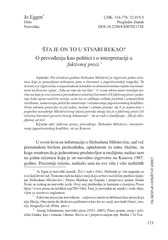Šta je on to u stvari rekao? O prevođenju kao politici i o interpretaciji u faktivnoj prozi
Апстракт
Twenty years ago, Slobodan Milošević uttered a sentence which was afterwards
repeated in the literature about the Yugoslav tragedy innummerable times. The
sentence „Niko ne sme da vas bije“ was directed to the Serb demonstrators in
Kosovo. In this text, the author analyzes the ways this sentence was translated in factional
literature (non-fiction literature: essays, newspaper article, history, biographies
etc.) and shows that different versions, apart from being different lexically and semantically,
influence the political interpretation and understanding of the Yugoslav
conflict. This text poses another, maybe even more important question: are unprecise
and wrong translations of Milošević‘s words a proof of what Georg Johannesen
claimed – that faction is fiction.
Кључне речи:
factual literature / translation / Slobodan Milošević / interpretiranje jugoslovenskog konfliktaИзвор:
Filozofija i društvo / Philosophy and Society, 2007, 173-186Издавач:
- Beograd: Institut za filozofiju i društvenu teoriju
Институција/група
IFDTTY - JOUR AU - Eggen, Jo PY - 2007 UR - http://rifdt.instifdt.bg.ac.rs/123456789/61 AB - Twenty years ago, Slobodan Milošević uttered a sentence which was afterwards repeated in the literature about the Yugoslav tragedy innummerable times. The sentence „Niko ne sme da vas bije“ was directed to the Serb demonstrators in Kosovo. In this text, the author analyzes the ways this sentence was translated in factional literature (non-fiction literature: essays, newspaper article, history, biographies etc.) and shows that different versions, apart from being different lexically and semantically, influence the political interpretation and understanding of the Yugoslav conflict. This text poses another, maybe even more important question: are unprecise and wrong translations of Milošević‘s words a proof of what Georg Johannesen claimed – that faction is fiction. PB - Beograd: Institut za filozofiju i društvenu teoriju T2 - Filozofija i društvo / Philosophy and Society T1 - Šta je on to u stvari rekao? O prevođenju kao politici i o interpretaciji u faktivnoj prozi SP - 173 EP - 186 DO - 10.2298/FID0702173E ER -
@article{
author = "Eggen, Jo",
year = "2007",
abstract = "Twenty years ago, Slobodan Milošević uttered a sentence which was afterwards
repeated in the literature about the Yugoslav tragedy innummerable times. The
sentence „Niko ne sme da vas bije“ was directed to the Serb demonstrators in
Kosovo. In this text, the author analyzes the ways this sentence was translated in factional
literature (non-fiction literature: essays, newspaper article, history, biographies
etc.) and shows that different versions, apart from being different lexically and semantically,
influence the political interpretation and understanding of the Yugoslav
conflict. This text poses another, maybe even more important question: are unprecise
and wrong translations of Milošević‘s words a proof of what Georg Johannesen
claimed – that faction is fiction.",
publisher = "Beograd: Institut za filozofiju i društvenu teoriju",
journal = "Filozofija i društvo / Philosophy and Society",
title = "Šta je on to u stvari rekao? O prevođenju kao politici i o interpretaciji u faktivnoj prozi",
pages = "173-186",
doi = "10.2298/FID0702173E"
}
Eggen, J.. (2007). Šta je on to u stvari rekao? O prevođenju kao politici i o interpretaciji u faktivnoj prozi. in Filozofija i društvo / Philosophy and Society Beograd: Institut za filozofiju i društvenu teoriju., 173-186. https://doi.org/10.2298/FID0702173E
Eggen J. Šta je on to u stvari rekao? O prevođenju kao politici i o interpretaciji u faktivnoj prozi. in Filozofija i društvo / Philosophy and Society. 2007;:173-186. doi:10.2298/FID0702173E .
Eggen, Jo, "Šta je on to u stvari rekao? O prevođenju kao politici i o interpretaciji u faktivnoj prozi" in Filozofija i društvo / Philosophy and Society (2007):173-186, https://doi.org/10.2298/FID0702173E . .


